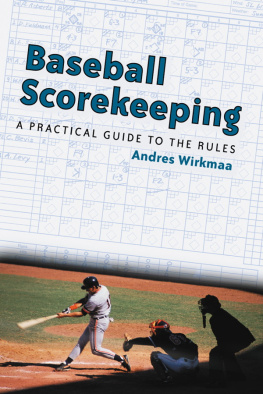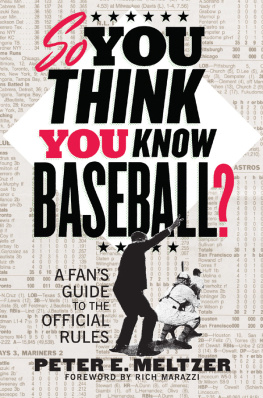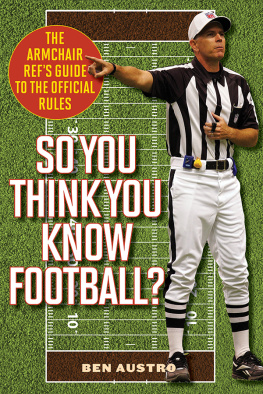
Table of Contents
Rule 10.01: The Duties, Responsibilities and Authority of the Official Scorer
Rule 10.02: Official Scorer's Reports
Rule 10.03: Miscellaneous Matters
Rule 10.04: Crediting Runs Batted In
Rule 10.05: Crediting Base Hits
Rule 10.06: Withholding Credit for Base Hits
Rule 10.07: Determining the Value of Base Hits
Rule 10.08: Crediting Stolen Bases
Rule 10.09: Crediting Sacrifice Bunts and Sacrifice Flies
Rule 10.10: Crediting Putouts
Rule 10.11: Crediting Assists
Rule 10.12. Crediting Double Plays and Triple Plays
Rule 10.13: Charging Errors
Rule 10.14: Not Charging Errors
Rule 10.15: Charging Wild Pitches and Passed Balls
Rule 10.16: Walks
Rule 10.17: Strikeouts
Rule 10.18: Determining Earned Runs
Rule 10.19. Determining Winning and Losing Pitchers
Rule 10.20: Crediting Saves
Rule 10.21: The Duties of the Official Statistician
Rule 10.22: Formulas for Determining Percentage Records
Rule 10.23: Minimum Standards for Determining Seasonal Percentage Record Championships
Rule 10.24: Criteria for Consecutive Hitting and Playing Streaks
LIBRARY OF CONGRESS CATALOGUING-IN-PUBLICATION DATA
Wirkmaa, Andres.
Baseball scorekeeping : a practical guide to the rules / by Andres Wirkmaa.
p. cm.
Includes index.
ISBN-13: 978-0-7864-1448-2
ISBN-10: 0-7864-1448-0
1. BaseballScorekeeping. I. Title.
GV879.W57 2003
796.357'028dc21 2003001966
British Library cataloguing data are available
2003 Andres Wirkmaa. All rights reserved
No part of this book may be reproduced or transmitted in any form or by any means, electronic or mechanical, including photocopying or recording, or by any information storage and retrieval system, without permission in writing from the publisher.
Cover image 2003 EyeWire
McFarland & Company, Inc., Publishers
Box 611, Jefferson, North Carolina 28640
www.mcfarlandpub.com
To my sons, Alex and Chris,
who inspired me
by showing me how wonderful
the game of baseball can be,
and to all my baseball friends.
And to my wife, Nancy,
without whom I would be just another bum.
Preface: Why Scorekeeping Is Important
Baseball is unique. There is no other team sport that lends itself so exceptionally well to being kept track of with simple abbreviations written on a simple grid.
Casual scorekeeping is a wonderful adjunct to taking in a ball game for countless baseball fans around the world. After all, its fun to keep score; and when youre doing it just for your own amusement, there isnt any compelling need to dot every i and cross every t.
However, serious scorekeepingthat is, official scorekeepingis different. To perform it properly and accurately requires a thorough knowledge of the rules that govern scorekeepingand those rules must be followed scrupulously to ensure that the data it generates are valid and true.
Moreover, in a very real sense, the official scorekeeper is a part of the game, and he or she fulfills an important function in baseball. While that function may not always be immediately obvious, it is nonetheless critical to the game as we know it.
Many rules in the official baseball rulebook apply either directly or indirectly to the scoring of baseball games. Unfortunately, many of them are written in language that is (to be charitable) far from a model of clarity. In fact, they are often complex and confusing. Given the difficulties that frequently arise in dealing with them, one might wonder why anyone would bother to keep track of anything more than the bare-boned basics of the game being scored. Why even try to comply with the complicated gibberish that is so often found in the text of the rules governing scorekeeping? After all, when all is said and done, doesnt it just come down to which team accumulated the most runswho won and who lost? Why take the time and trouble to deal with all the technicalities and fine points? Why even have an official scorer and official rules of scorekeeping?
The answer is simple: What is referred to in baseball as a scorekeeper or scorer is in reality a statistics keeper, and he or she is called upon to do far more than just keep track of runs and outs and report the final score. In fact, the official scorer is obliged to record (accurately and in strict conformity with the rules governing scorekeeping) all the information and data necessary to compute the myriad statistics associated with the gameincluding runs batted in, base hits, stolen bases, sacrifice bunts, sacrifice flies, double and triple plays, putouts, assists, errors, wild pitches, passed balls, walks, strikeouts, earned and unearned runs, savesand much more.
The very idea of having an official scorer and official rules for scorekeeping comes from the fact that statistics are a well-established and important component of baseball. Box scores, batting averages, streaks, and the like are all essential parts of the enjoyment, appreciation, and understanding of baseball. Statistical records set, and statistical records broken, have always been a major aspect of the game. They often define the people and events that make up the ongoing chronicle and lore of baseball. In addition, statistics allow comparison of teams, players, seasons, or what have you, thereby creating fuel and fodder for discussion and debate at all levels of the game.
There is no doubt that detailed statistics constitute a significant element of the gameand without consistent, accurate, and comprehensive scorekeeping, there would be no authoritative and reliable data from which to generate valid and meaningful statistics. And if statistics were not a part of the game, and the history of baseball was limited to nothing more than a chronology of games won or lost, the national pastime would be threadbare in contrast to the remarkable ongoing mosaic of storied achievements that it is.
Consequently, having a set of rules for scorekeepers to follow advances the goal of consistency in scorekeepingso that, for example, an RBI, a sacrifice bunt, or an earned run is recognized and recorded in the same fashion everywhere and all the timeregardless of when or where a particular game is being played or who the official scorer might be. This, in turn, enhances the credibility of the games statistical records.
Accordingly,
Scorekeeping performed in strict conformity with the rules of scorekeeping generates valid and consistent data.
Valid and consistent data generates reliable statistics.
Reliable statistics are at the very foundation of the game of baseball as it is now, and has been for decades, known and enjoyed throughout the world.
That being the case, scorekeepingand its rulesare an essential part of baseball. That is why scorekeeping is important.
With all that in mind, this book was written to explain and clarify the somewhat daunting maze of rules that govern official scorekeeping. In doing so, this book aims to assist conscientious scorekeepers everywhere to properly employ and accurately apply those rules when performing their important dutiesall in the best interests of the game that (after more than 150 years of existence) continues to be played, relished, and loved not only in the United States but throughout the world.
I sincerely hope that this work brings to its readers a better understanding of the rules governing baseball scorekeeping, along with a deeper appreciation of the game of baseball and all its many nuances. Those who find such appreciation will, I hope, also find increased pleasure in the game, whether they participate in baseball on the field of play; in the press box; in the stands; or anywhere else that a game of baseball can be enjoyed.
Next page






